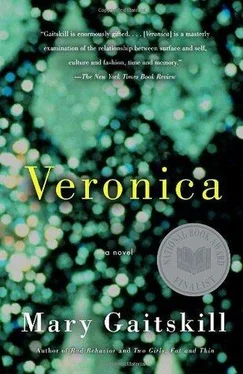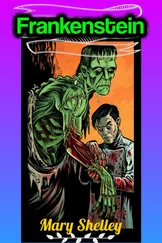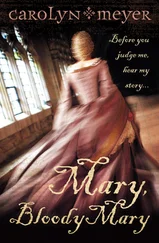Our father’s father was a heavy drinker who, to supplement his income as a mail clerk, sang for tips at a local bar. One night, he got in the middle of a fight; a knife was pulled, and my father, ten, was orphaned because an ambulance blew a tire on a back road. (Somewhere the driver is still trying to change the tire while his rotating red light rhythmically drenches the dirt and sweeps the sky.) His brother, Ray, fourteen at the time, helped his mother support the family by going to work for a butcher. He enlisted in the army at eighteen and was dead at twenty-two. This we knew. The rest we had invented by looking at pictures of Ray and listening to things our mother had said in certain tones of voice. We’d gotten the story about the spelling bee from Daddy’s great-aunt Claire, who’d been at the bank when Daddy had gone with his mother to deposit the fifty-dollar prize he’d won. He told the teller about the spelling bee and his mother snapped, “Stop bragging on yourself, you swell-headed brat.”
Daphne gave a tense, shuddering sigh; her breath then was always high and strained. “Then Ray died in the war,” she said, “and he could be turned into the perfect brother who loved Daddy as much as Daddy loved him.” She finally fell silent, trying to calm her breath. Colorless smoke billowed out a chimney and rose churning into the sky. The folded place vanished. Our childhood slipped back through its private door. There was nothing but breathing and the light rub and rasp of our clothes. But somewhere, in the sky, in the snow, in a hidden, folded place between them, was a perfect brother who loved as much as he was loved.
When we got back, the house was warm and dark except for the Christmas tree, its burning lights making glowing caves in its branches, jeweled with soft colors and the lit intensity of tiny needles. The blood tingled in our legs as we stamped our feet on the front mat; dangling tinsel stirred with our motion, ghost light alive in each strand. It was beautiful and brimmed with love. Yet the unsaid things remained mute and obdurate. As we went upstairs to bed, they stood like invisible stone tablets, unreadable and indifferent to our words. When we lay down, Daphne slept, but I turned back and forth between sleep and wakefulness. It was there again, clanging between dream and thought — the mental sensation that in the next room our parents were screaming curses and attacking each other like animals. I turned on the light and remembered them as I had seen them earlier that day at the grocery store: an overweight man and a tall pear-shaped woman with their glasses on the ends of their noses, staring about them in mild confusion, their carts full of bargain eggnog and candy canes. I remembered the tree downstairs, the lights outside, and the sky.
Yes, we were stupid for disrespecting the limits placed before us; for trying to go everywhere and know everything. Stupid, spoiled, and arrogant. But we were right, too. I was right. How could I do otherwise when the violence of the unsaid things became so great that it kept me awake at night? When I saw my father sitting in a chair, desperate to express what was inside him, making a code out of outdated symbols even his contemporaries could no longer recognize? When I saw him smile because my mother fell on her face and then put the smile away like it was a piece of paper? When I heard him rail against dying men because otherwise he had no form to give his hates and fears? All the meat of truth was hidden under a dry surface, and so we tore off the surface with a shout. We wanted to have everything revealed and made articulate, everything, even our greatest embarrassments and lusts.
I walk faster and faster, apace of my chattering mind. Here is another slim ocher tree naked of bark. It is utterly smooth and, in the rain, so shiny that it looks almost plastic. It is twisted so elegantly, it is like an art object, made to suggest irony and hauteur. Veronica and Duncan didn’t have to attack each other in the hidden world one glimpses before sleep. They were what they were in public. His lust and scorn, her abjection and bitterness — these were acted out on city streets in graphic, unapologetic form. Not merely unapologetic but ironic, elegant, and haughty. I take off my glove and stroke the tree trunk as I walk past. I wonder if it is diseased. Everyone knows they’re diseased .
But we were not satisfied with revealing and articulating; we came to insist that our embarrassments and lusts were actually beautiful. And sometimes they were — or at least could be made to look it. The first high-end job I had in New York was with two other girls, one of whom was an unstable lesbian with dark, dramatic looks and a known hard-on for the other, a bland blonde from Norway who didn’t speak English. The photographer had us pose at night against the chain-link fence of a deserted ball field. He put me and Ava, the Nordic girl, on one side of the fence and Pia, the dyke, on the other. He photographed Pia alone. He photographed Ava and me together, me slightly behind her to indicate my sidekick status. He photographed Ava and me holding hands while Pia pressed up against the fence. At the end, he had Pia strip down to her underwear and hurl herself onto the fence, like she was “trying to get to Ava,” grabbing it with her hands and bare feet. Most models of Pia’s stature would never have done that. But he knew she would. She was half out of her mind with lovelessness and rage, and she wanted people to see it — she wanted it revealed and articulated. She threw herself at the fence again and again, until her hands and feet were bleeding. That shot ran at the end of a three-page spread and it was a great picture; Pia’s nakedness was blurred by the fence and by her motion, but her face and flying hair came at you like demon beauty bursting out of darkness to devour human beauty. Ava and I huddled together in our pale spring lace, two maids lost in a postmodern wood, she moving forward, me half-turning toward the demon who silently howled at us with her great gold eyes, her genital mouth and long flawless claws with just a hint of anguish in their swollen knuckles. Of course, you didn’t see any blood. You didn’t see human pain on the demon’s face — or rather, you saw it as a shadow, a slight darkness that foregrounded the beauty of the picture and gave it a sort of luscious depth. It was a page-stopper. It restarted my career.
After Christmas, I went to see Jamie and found him making model airplanes with a fourteen-year-old girl. She had full deep-colored lips with no set to them yet, dark, snapping eyes, and gold skin intensely refrained in the fiery gold aura around her pupils. Her laughing eyes lightly touched mine on their way up and down my body; she was not as pretty as I was, but it didn’t matter — she giggled behind her hand as Jamie giddily explained that she was his roommate’s friend’s daughter. I looked at him. The black and gold of her pupils saturated his eyes and shone from them, and in their light I was a mortal in someone else’s heaven. I turned and walked away, while Jamie followed me to the door, protesting that he would call me, until I shut the door on his hand and ran down the stairs.
That night, Veronica wasn’t at work, and for the first time I missed her. When the shift was over, instead of taking a taxi home, I walked blocks of asphalt glossy with yellow lamplight and streaming with yellow cabs, each with a hard nugget of human head inside. When the tears finally came, I sat on a bench in front of the Public Library and let them fall. A man with a face like the bottom of a broken shoe discreetly worked around me, slowly and painfully collecting cigarette butts off the ground and storing them in his pocket. He didn’t look at me, but he sang a nasal, wordless song that touched me like calm hands.
Читать дальше












